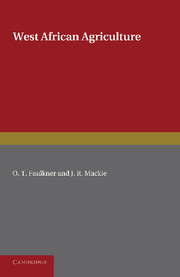Book contents
- Frontmatter
- Contents
- Preface
- PART I GENERAL
- PART II CROPS AND STOCK
- Chapter 9 The Oil Palm
- Chapter 10 Cocoa, Kola, Coconuts, Rubber
- Chapter 11 Cotton, Groundnuts, Benniseed, Ginger
- Chapter 12 Cereal Crops: Maize, Guinea Corn, Millets, Rice
- Chapter 13 Root Crops and Minor Food Crops: Yams, Cassava, Sweet Potatoes, Coco Yams, Beans and Cowpeas, Bambara Groundnut, Onions and Vegetables
- Chapter 14 Livestock
- Index
Chapter 9 - The Oil Palm
from PART II - CROPS AND STOCK
Published online by Cambridge University Press: 05 June 2016
- Frontmatter
- Contents
- Preface
- PART I GENERAL
- PART II CROPS AND STOCK
- Chapter 9 The Oil Palm
- Chapter 10 Cocoa, Kola, Coconuts, Rubber
- Chapter 11 Cotton, Groundnuts, Benniseed, Ginger
- Chapter 12 Cereal Crops: Maize, Guinea Corn, Millets, Rice
- Chapter 13 Root Crops and Minor Food Crops: Yams, Cassava, Sweet Potatoes, Coco Yams, Beans and Cowpeas, Bambara Groundnut, Onions and Vegetables
- Chapter 14 Livestock
- Index
Summary
The oil palm is indigenous to West Africa, and, until quite recently, was grown nowhere else. It occurs in all the countries from Sierra Leone to the Congo, wherever the average annual rainfall amounts to 60 inches or so distributed over not less than eight months of the year, and where there are many people. For, although it grows semi-wild, the oil palm is always associated with population. There are indeed some areas which are very thinly populated at present where the oil palms are numerous; but it is probable that those areas were more densely peopled in the past.
Palm kernels form the bulk of the exports of Sierra Leone and constitute the most important among the several exports from Southern Nigeria, while palm oil ranks second. There is a very considerable export of both oil and kernels from the Belgian Congo, and lesser amounts from other West African countries.
Recently the cultivation of the oil palm has been taken up by the planters of Sumatra and, in a lesser degree, in Malaya. As yet the export from these Eastern countries is quite paltry in comparison with that from West Africa. But a few years ago it was feared that the extension of oil plantations in the East might be so rapid as to exceed the growth of the world's demand for palm oil, and thus to cause a serious diminution of its value in the world's market. For although the world's total demand for vegetable oil is very considerable, and although to some extent one oil can replace another in manufacturing processes, yet there is also a special market for each particular class of oil, and a great overproduction of palm oil would be likely to lead to a heavy slump in its value. However, it seems that the planters in Sumatra and Malaya have recently realized that their early estimates of the yields which they could expect to obtain from cultivated oil palms were much exaggerated. Thus, although the cultivation of the palm in the Far East will almost certainly continue to spread steadily, there now seems less danger than there was a few years ago of a very rapid extension of these plantations.
- Type
- Chapter
- Information
- West African Agriculture , pp. 93 - 104Publisher: Cambridge University PressPrint publication year: 2013



